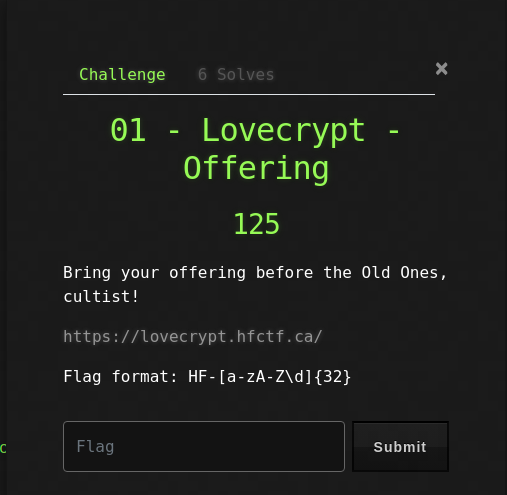
Hackfest 2021 Writeup - LoveCrypt - Offering
This one is the first challenge I solved at the Hackfest 2021 CTF. I first overlooked it because I am not very good at crypto. But when I took a better look at it, it was not very hard.

Bring your offering before the Old Ones, cultist!
The description of the challenge was short. It contained a link to a web site.

The site had a few links, if I remember well they didn’t bring me anywhere.
At the bottom of the site, there was something that looked like a flag.
If you’re a true cultist, you’re familiar with our insanely secure cipher and you’ll know what to do with this : HF-{wpLDu8K0wq3HocSIx4bFi8agx53HvcKoxJLGi8eIxIXCpce0x7rFm8KsxKnCpcakx57Gr8ekxIXCtcKkwrrDow==}
This is clearly Base64 encoded, so I took tried to decode it, but got only garbage out.
$ echo wpLDu8K0wq3HocSIx4bFi8agx53HvcKoxJLGi8eIxIXCpce0x7rFm8KsxKnCpcakx57Gr8ekxIXCtcKkwrrDow== | base64 -d
û´ǡĈdžŋƠǝǽ¨ĒƋLją¥ǴǺś¬ĩ¥ƤǞƯǤąµ¤ºã%
I needed to figure out how to decrypt it. In the page source code, I found a big comment that looked like some source code. But unreadable.
#!/hfe/ova/rai clguba3
# Cu’atyhv ztyj’ansu Pguhyuh E’ylru jtnu’anty sugnta.
# -- UNAQF BSS VS LBH'ER ABG N PHYGVFG --
vzcbeg netcnefr
vzcbeg onfr64
qrs znva():
cnefre = netcnefr.NethzragCnefre()
cnefre.nqq_nethzrag("bssrevat", uryc="Cerfrag lbhe bssrevat gb gur Byq Barf, phygvfg!")
netf = cnefre.cnefr_netf()
bssrevat = netf.bssrevat
cevag("\aVä! Fuho-Avtthengu!\a")
cevag("---------------------------------")
rapelcg(bssrevat)
cevag("---------------------------------")
cevag("\aPguhyuh sugnta! ^(;,;)^\a")
qrs rapelcg(cnlybnq):
pvcure = ""
frperg = "alneyngubgrc"
xrl = "e'ylru" * 13
xrl = xrl[:yra(cnlybnq)]
sbeovqqra_punef = []
sbe yrggre va frperg:
vs yrggre abg va sbeovqqra_punef:
sbeovqqra_punef.nccraq(yrggre)
sbe yrggre va cnlybnq:
vs yrggre va sbeovqqra_punef:
pune_pbqr = beq(yrggre) - 13
yrggre = pue(pune_pbqr)
pune_pbqr = beq(yrggre) << 2
yrggre = pue(pune_pbqr)
pvcure += yrggre
pvcure = pvcure[::-1]
kberq_pvcure = ''.wbva(pue(beq(k) ^ beq(l)) sbe k,l va mvc(pvcure,xrl))
pvcure = (onfr64.o64rapbqr(kberq_pvcure.rapbqr('hgs-8'))).qrpbqr('hgs-8')
cevag("Urer'f lbhe rapelcgrq bssrevat :\a")
cevag(pvcure)
vs __anzr__ == "__znva__":
znva()
The first line looked like the shebang of a script. And the overall structure looked like some Python code. But unreadable.
I took the code to CyberChef and used ROT13 on it.
That gave me back the following Python code.
#!/usr/bin/env python3
# Ph’nglui mglw’nafh Cthulhu R’lyeh wgah’nagl fhtagn.
# -- HANDS OFF IF YOU'RE NOT A CULTIST --
import argparse
import base64
def main():
parser = argparse.ArgumentParser()
parser.add_argument("offering", help="Present your offering to the Old Ones, cultist!")
args = parser.parse_args()
offering = args.offering
print("\nIä! Shub-Niggurath!\n")
print("---------------------------------")
encrypt(offering)
print("---------------------------------")
print("\nCthulhu fhtagn! ^(;,;)^\n")
def encrypt(payload):
cipher = ""
secret = "nyarlathotep"
key = "r'lyeh" * 13
key = key[:len(payload)]
forbidden_chars = []
for letter in secret:
if letter not in forbidden_chars:
forbidden_chars.append(letter)
for letter in payload:
if letter in forbidden_chars:
char_code = ord(letter) - 13
letter = chr(char_code)
char_code = ord(letter) << 2
letter = chr(char_code)
cipher += letter
cipher = cipher[::-1]
xored_cipher = ''.join(chr(ord(x) ^ ord(y)) for x,y in zip(cipher,key))
cipher = (base64.b64encode(xored_cipher.encode('utf-8'))).decode('utf-8')
print("Here's your encrypted offering :\n")
print(cipher)
if __name__ == "__main__":
main()
This is the code used to encrypt the flag, with the key included. I just needed to reverse it to decrypt the flag on the page.
#!/usr/bin/env python3
# Ph’nglui mglw’nafh Cthulhu R’lyeh wgah’nagl fhtagn.
# -- HANDS OFF IF YOU'RE NOT A CULTIST --
import argparse
import base64
def main():
parser = argparse.ArgumentParser()
parser.add_argument(
"offering", help="Present your offering to the Old Ones, cultist!")
args = parser.parse_args()
offering = args.offering
print("\nIä! Shub-Niggurath!\n")
print("---------------------------------")
decrypt(offering)
print("---------------------------------")
print("\nCthulhu fhtagn! ^(;,;)^\n")
def decrypt(payload):
cipher = (base64.b64decode(payload.encode('utf-8'))).decode('utf-8')
key = "r'lyeh" * 13
secret = "nyarlathotep"
key = key[:len(cipher)]
cipher = ''.join(chr(ord(y) ^ ord(x)) for x, y in zip(cipher, key))
cipher = cipher[::-1]
forbidden_chars = []
for letter in secret:
letter = ord(letter) - 13
if letter not in forbidden_chars:
forbidden_chars.append(letter)
decoded = ""
for letter in cipher:
char_code = ord(letter) >> 2
if char_code in forbidden_chars:
char_code = char_code + 13
letter = chr(char_code)
decoded += letter
print(decoded)
if __name__ == "__main__":
main()
We the script written, I called it and got the flag back.
python3 decrypt.py wpLDu8K0wq3HocSIx4bFi8agx53HvcKoxJLGi8eIxIXCpce0x7rFm8KsxKnCpcakx57Gr8ekxIXCtcKkwrrDow==
Iä! Shub-Niggurath!
---------------------------------
1234looks0a0lot0like0fishmen5678
---------------------------------
Cthulhu fhtagn! ^(;,;)^
Flag: FLAG-1234looks0a0lot0like0fishmen5678